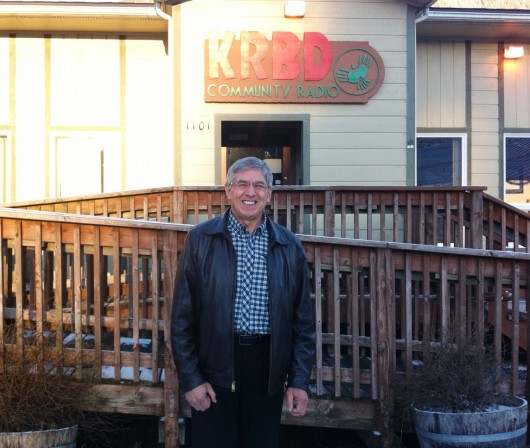Lt. Gov. Byron Mallott was in Ketchikan earlier this week to address Ketchikan Indian Community’s Southeast Tribal Environmental Conference.
During the environmental conference in Ketchikan, the lieutenant governor addressed transboundary mining and other environmental issues that affect Southeast.
Mallott was in Washington D.C. September 15th and 16th, attending the “Our Ocean” conference hosted by Secretary of State John Kerry. The international conference focuses on marine protected areas, sustainable fisheries, marine pollution, and climate-related impacts on the ocean. Mallott says Alaska is already seeing the affects of climate change and ocean acidification. While in D.C., he met with Jerry Abramson, Deputy Assistant to President Obama and Director of Intergovernmental Affairs, along with other White House staff.
“To urge them, in the Department of Interior’s next five-year, offshore petroleum leasing cycle, that the Beaufort and Chukchi Seas be included in that five-year planning cycle. The state has formally made the request. My meeting was to emphasize its importance to the State of Alaska.”
He says he also discussed the changing relationships between state and tribal governments in Alaska. Mallot says the state has withdrawn from further appeal in the Land-Into-Trust issue. The legislation allows the Department of the Interior to take Alaska tribes’ land into trust. Alaska argued this would create uncertainty around governmental jurisdiction. The state decided to drop the appeal and work toward consensus outside the courtroom.
 Mallot says he also expressed concern about a recent decision by the U.S. Fish and Wildlife Service to assume all management of fish and wildlife on Federal lands.
Mallot says he also expressed concern about a recent decision by the U.S. Fish and Wildlife Service to assume all management of fish and wildlife on Federal lands.
“And that if we are not able to negotiate with the federal government and retain fish and game management on federal lands in Alaska, it’s likely this state will have to litigate or at least do everything it can to retain that management.”
Mallott says the federal government’s policy is to “let nature take its course,” and he’s concerned about the affect that would have on fish and wildlife. He says Alaska’s approach is balanced management using predator control. Mallot says it’s also a constitutional issue.
“States have managed fish and game resources on all lands within their borders. This would essentially begin the process of the Federal government asserting fish and wildlife management primacy on 64 percent of the lands within the State of Alaska.”
Mallott says he also met with Russian ambassador Sergey Kislyak (SUR-gay KIZ-lee-ack) while in D.C. Next year marks the 150th anniversary of the U.S. purchase of Alaska from Russia. Mallot says he invited the ambassador to attend some of the commemorations that will take place next year.
Mallot says he was invited to meet with leaders in Russia to discuss shared opportunities between Alaska and Russia, especially in the Bering Strait region.
“We discussed, generally, the opportunities to view Russian local economic development, and relationships between the aboriginal peoples in the Russian arctic.”
He says they also discussed transportation, with Alaska as a possible airline hub between Russia and Seattle, and opportunities to strengthen research in the Arctic Region.
Mallott spoke about the need to continue to work with other governments to help improve Alaska’s economy and transportation. He says a railroad link between Alaska and the Lower 48 would open up economic opportunities.
“The relationship between Canada and the U.S., the relationship between the State of Alaska, and British Columbia, and the Yukon Territory, and other governments are important to us over time developing our own infrastructure, because infrastructure ultimately needs to connect with other places in order to develop an economy.”
Mallott says Alaska and Canada already have memorandums of agreement in place that provide a framework for addressing transboundary issues. He says something similar could be used to develop infrastructure.
Mallot also discussed Alaska’s economic crisis. He says if the 2017 Legislature does not come up with a solution, the state will have to draw down on savings, which is not sustainable.
“If we have to draw down multi-billions from remaining reserves, we will be at the tipping point of potentially not having the ability to fund a state budget that allows us to meet our needs and grow the state.”
Mallott believes the 2017 Legislature will take action. He says he supports Governor Bill Walker’s plan. Mallot says using earnings from the Permanent Fund would cover about 70 percent of the budget, but other sources of revenue would be needed. He encourages constituents to talk to their representatives. Mallott suggested voters can also make their wishes clear at the ballot box.






